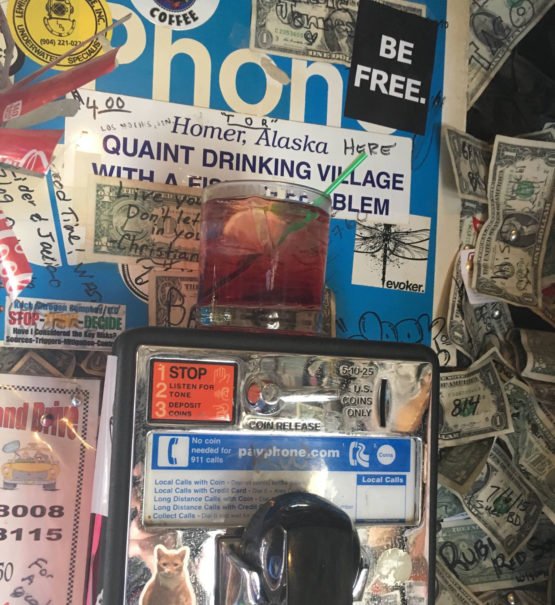
Watching Two Mentally Unstable Bullies Posture With Globe‑Killing Slingshots

Watching Two Mentally Unstable Bullies Posture With Globe‑Killing Slingshots

Vodka in Alaska
I hunched over the edge of the bar, questioning my life choices in a line of other regulars who were probably doing the same. Have I spent my time in this world wisely? Do I have any regrets?
On Independence Day, North Korea claimed it tested a missile that experts said put the United States—specifically, Alaska—within firing range. HLN’s barrage of Trump tweets and images of a beaming Kim Jong-un rotated on an ancient television perched on a cabinet high enough to give me a crick in my neck. Looking down at a grimacingly strong Cape Cod cocktail gave me some relief.
Locals know, and visitors quickly realize, that at Homer, Alaska’s “World Famous” Salty Dawg Saloon, beer comes in 20-ounce cans and mixer is basically garnish. It is not unusual to see otherwise respectable-appearing individuals stagger out of the bar in the middle of the day looking a shade of green that has little to do with sea travel.
Having the luxury of being able to appear less than respectable at 2 o’clock on a Monday afternoon, I stabbed at the ice in my cocktail and wondered if the rail vodka or a creeping horror I hadn’t felt since adolescence was going to win the battle over my autonomic system. Here I sat, watching two mentally unstable bullies posture with globe-killing slingshots sticking out of their back pockets.
Scrape away Homer’s encrusted layer of gift shops and art galleries, and you find the rough wooden planking of the original commercial fishing village. Much of Homer’s settlers are taciturn fishermen of Scandinavian descent who migrated up the west coast from Washington and Oregon.
Homer was dubbed Alaska’s “Cosmic Hamlet by the Sea” in the 1970s by an honest-to-god guru, Brother Asaiah Bates, who was the leader of an honest-to-god commune, The Barefooters, living “off-grid” before there was such a term.
In the early 80s, at the height of the Cold War, the population of Homer voted to make itself a Nuclear Free Zone. A toothless resolution by a small-town City Council holding most of its meetings on bar stools didn’t mean much in the grand political scheme of things during the epically strained political climate of the day. For Homer residents, however, the sentiment was particularly on point.
Homer sits on a deep-water harbor that remains ice-free all year at the top of the Pacific Ocean. During World War II, the Army Corps of Engineers built Homer’s harbor, along with a radar installation to defend against the Japanese who were occupying territory 1500 miles out on the Aleutian Chain and headed toward the mainland. Quaint little Homer is, in other words, a militarily strategic location.
As a child, I would peer into the waters of Cook Inlet, stretched below our home that sat on a high bluff, trying to see the submarines, ours and Soviet, that were purportedly playing nuclear hide-and-seek in the deep and narrow channel. Every night the local news reported on games of tag that our fighters from Elemendorf Air Force Base were playing with Russian “Bears” over Alaskan air space. Our elementary school practiced duck and cover air-raid drills where our little bodies would cram under desks and tables and pretend that it would make a difference in the event of a nuclear strike. The Cold War was a concrete reality for us, even in the late 80s, and I was fairly certain I wouldn’t grow up.
I grew up at the end of the Cold War. Gorbachev was practicing glasnost and Yeltsin was waving red, white, and blue Russian Federation flags from Soviet tanks. Despite my childhood fears, there was a glimmer of hope on my horizon. But I know now, between Donald Trump and Kim Jong-un, how my grandparents felt, looking over the waters of the Gulf of Alaska, during the Cuban Missile Crisis.
I wept when the Berlin Wall came down. I was 13. The Cold War was officially over. I’d live to take my first legal drink.
Despite the fog of cheap Russian vodka and panic (they’d apparently signed a mutual aid agreement), I didn’t have the luxury of weeping for joy or fear now. I am old, and the other fishermen were watching. Instead, I did what we do nowadays and took out my phone. I drafted a quick text message (“RESIST”) to my Republican congressional delegates in Washington, urging them to put a leash on their president, made some questionable retweets, and then called a cab.